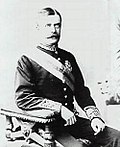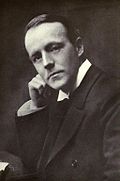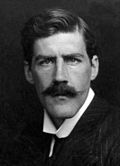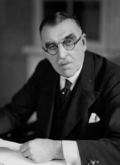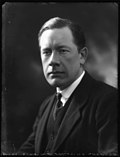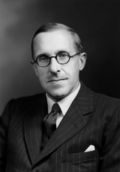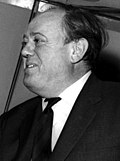| United Kingdom Minister of Agriculture, Fisheries and Food | |
|---|---|
 | |
| Ministry of Agriculture, Fisheries and Food | |
| Type | Minister of the Crown |
| Member of | |
| Reports to | The Prime Minister |
| Seat | Westminster |
| Nominator | The Prime Minister |
| Appointer | The Monarch (on the advice of the Prime Minister) |
| Term length | At His Majesty's pleasure |
| Formation | 9 September 1889 |
| First holder | Peter Walker |
| Final holder | Nick Brown |
| Abolished | 27 March 2002 |
The Minister of Agriculture, Fisheries and Food was a United Kingdom cabinet position, responsible for the Ministry of Agriculture, Fisheries and Food. The post was originally named President of the Board of Agriculture and was created in 1889. In 1903, an Act was passed to transfer to the new styled Board of Agriculture and Fisheries certain powers and duties relating to the fishing industry, and the post was renamed President of the Board of Agriculture and Fisheries.
Contents
- List of Agriculture Ministers and Board Presidents
- Presidents of the Board of Agriculture (1889–1903)
- Presidents of the Board of Agriculture and Fisheries (1903–1919)
- Ministers of Agriculture and Fisheries, (1919–1954)
- Ministers of Agriculture, Fisheries and Food (1954–2001)
- Notes
- Citations
In 1919, it was renamed Minister of Agriculture and Fisheries. In 1954, the separate position of Minister of Food was merged into the post and it was renamed Minister of Agriculture, Fisheries and Food.
On 8 June 2001, the Ministry merged with Secretary of State for the Environment into the office of Secretary of State for Environment, Food and Rural Affairs. However, the Ministry of Agriculture, Fisheries and Food was not formally abolished until The Ministry of Agriculture, Fisheries and Food (Dissolution) Order 2002 (S.I. 2002/794) came into force on 27 March 2002.
Until the Dissolution Order also made the necessary amendments to the law when it did come into force, many statutory functions were still vested in the holder of the office of Minister of Agriculture, Fisheries and Food, rather in the Secretary of State at large. For that reason, in a final twist, Margaret Beckett had to be appointed formally as the last Minister of Agriculture, Fisheries and Food as well as becoming the first Secretary of State for Environment, Food and Rural Affairs.[ citation needed ]
The position was the last cabinet role (except that of Prime Minister) in the United Kingdom government to bear the 'Minister' title [1] ; since its abolition, heads of all government departments have been Secretaries of State. The title continues to be used for junior ranking ministers in charge of sub-portfolios, styled Ministers of State.







